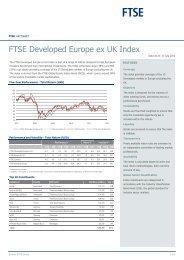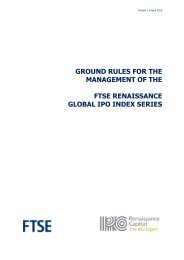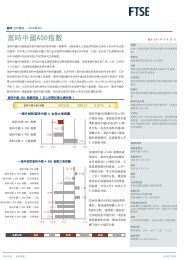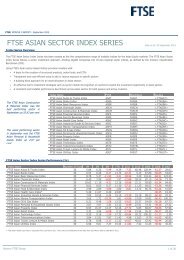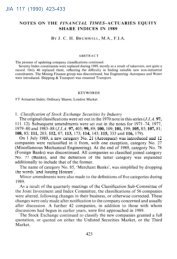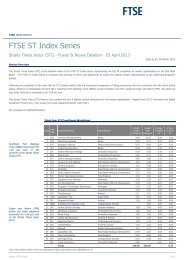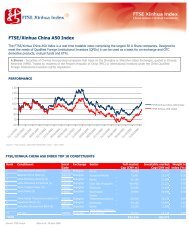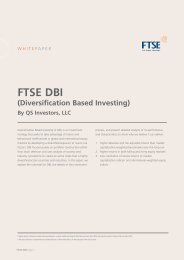Section 2 - FTSE
Section 2 - FTSE
Section 2 - FTSE
Create successful ePaper yourself
Turn your PDF publications into a flip-book with our unique Google optimized e-Paper software.
THE SECURITIES LENDING ROUNDTABLE<br />
62<br />
DEFINING BEST EXECUTION<br />
DR: In general terms, my understanding is that for agent<br />
lenders, best execution mean looking to get the best deal<br />
for customers, having policies setting out how you do that<br />
and being transparent with customers. Most people have<br />
behaved that way and we have a well regulated and fair<br />
industry in that respect in any case.<br />
MF: And shame on the industry for lobbying as they did<br />
and getting off the hook on this one.<br />
DR: I do not think that they did get off the hook, because<br />
I don’t think there was a hook in the first place<br />
MF: But there is no obligation to provide best execution.<br />
There was discussion as to whether it would be relevant<br />
and extended into the world of securities lending and the<br />
industry got together and wrote a letter, which quite<br />
frankly shocked me in terms of its contents and got off the<br />
hook. So, typical clients who spend very little time thinking<br />
about securities lending, would reasonably expect to be<br />
protected by MiFiD and best execution and they aren’t.<br />
DR: They will be actually, because many agent lenders are<br />
concluding that they actually do have to offer best execution<br />
to their clients, because they are going to be treated as<br />
professionals and depending on your interpretation of the<br />
runes from the European Commission, securities lending<br />
may or may not be—and some people are concluding that<br />
it is—an execution of client orders<br />
MF: That would be very welcome. I am heartened to here<br />
that, the clients will be too and that will be a winning<br />
strategic decision.<br />
DR: The question is what does best execution amount to?<br />
What it doesn’t amount to is that you have to execute at<br />
this market price, which is on a ticker tape, because that<br />
does not exist in securities lending and securities lending<br />
transactions are not as simple as equities sales. There are<br />
different dimensions to the transaction, and therefore<br />
acting in the client’s interest does not necessarily mean<br />
dealing at one particular price—it also depends on the<br />
client’s collateral needs and tax status, etc. So what the best<br />
execution will amount to is in effect having a policy that<br />
says to the customer that we will act in your best interests.<br />
RS: The debate has actually moved on. Looking at the latest<br />
guidance provided by the FSA and the response of the<br />
European Commission to CESR, a client will always need to<br />
be properly protected whether retail, professional or eligible<br />
counterparty. Every lending provider has to look at this in<br />
the context of the firm’s overall approach to best execution<br />
and JPMorgan has written a best execution policy which<br />
outlines very clearly how we would operate on behalf of our<br />
clients to obtain the best possible outcome. The challenge is<br />
that securities lending is not a business that fits very neatly<br />
into a trade by trade disclosure regime and people arguing<br />
for that are potentially going to do the industry a disservice<br />
by leveraging a huge cost base on it, which frankly it is not<br />
in a position to support at the moment.<br />
CJ: I would come back to the issue raised earlier about<br />
pricing and so called cherry-picking. It is a strange concept<br />
in this industry where some view that there is something<br />
bad about a beneficial owner choosing to take their assets<br />
and lend through a different route or a different provider.<br />
They feel that it is somehow unfair to a custody provider<br />
who now only has to charge transaction fees for supporting<br />
the custody function of lending. Securities lending is not an<br />
entitlement of custody providers so their pricing should just<br />
be set according to what service they provide. The industry<br />
should stop utilizing opaque pricing structures where the<br />
clients do not know how much they are actually paying for<br />
the different services being provided. These bundled<br />
arrangements prevent beneficial owners from evaluating all<br />
options and making proper informed decisions.<br />
JP: Until recently, I had never seen an RFP response from a<br />
custodian that did not include the condition that this<br />
pricing structure is conditional on them getting more<br />
securities lending.<br />
MC: When I asked this question of a custodian in a similar<br />
forum earlier this year, they told me that increasingly they<br />
were being asked to strip that out and quote separately for<br />
securities lending and ‘core’ custody. Because of the rise of<br />
third party lending agents, auction platforms, alternative<br />
routes to market, there is a desire on behalf of the ultimate<br />
customer to see that transparency and the custodians<br />
simply do not have a choice here.<br />
JP: That is very true but they used to just ignore it. In RFP<br />
exercises before I joined Mercer, we were absolutely<br />
explicit. The actual phrase used was: “You should assume<br />
that you will get none of our lending business”. We still got<br />
fee quotes that assumed a level of lending income. Then,<br />
there was then surprise when we lent the most lucrative<br />
asset classes through a third party.<br />
MF: I am asking for some adoption of standards that apply<br />
across the industry, not more information that is part of this<br />
kind of gentle obfuscation of pricing and information and<br />
bundling together of everything. Those days should be and<br />
are slowly going away, but this is just is just another subtle<br />
example of just more obfuscation.<br />
RS: Many of us use independent data providers to report to<br />
our clients on their programme performance. However<br />
most clients do not want to be called every day, preferring<br />
to look at it over a period of time and my second point is:<br />
what would the benchmark be, and could it have been<br />
implemented effectively in time?<br />
NOVEMBER/DECEMBER 2007 • <strong>FTSE</strong> GLOBAL MARKETS



